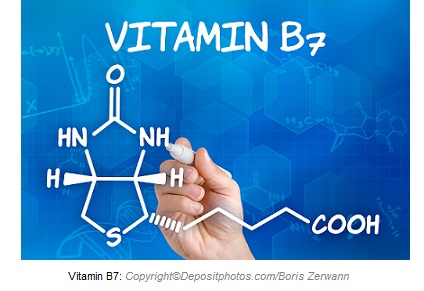 that plays a role in the metabolism of carbohydrates, fats, and proteins. The popularity of biotin comes from the fact that it has a “hair – stimulating effect”, promoting hair growth and slowing down the progression of graying hairs.
that plays a role in the metabolism of carbohydrates, fats, and proteins. The popularity of biotin comes from the fact that it has a “hair – stimulating effect”, promoting hair growth and slowing down the progression of graying hairs.
Functions of Biotin:
- It plays a role in gene expression.
- It is important for the synthesis of fatty acids.
- It assists with the catabolism of the branched – chain amino acids: leucine, isoleucine, and valine.
- It participates in gluconeogenesis (production of glucose from non – carbohydrate substances).
- It may help maintain normal blood sugar level.
Food Sources and Absorption:
Food sources of biotin include organ meats such as liver and kidney, soy, beans, carrots, tomato, onion, cabbage, Swiss chard, yeast, and egg yolk. However, raw egg white contains a protein named avidin, which strongly binds with biotin in the stomach and reduces its absorption. Cooking inactivates or destroys the avidin. So, cooked egg white does not affect the absorption of biotin.
Biotin is also produced by good bacteria in the small intestine. It is absorbed from the small intestine.
Benefits of Biotin:
Biotin may be beneficial in the following conditions:
- Hair loss and graying hairs.
- Brittle nails.
- Diabetes.
- Peripheral neuropathies.
- Cradle Cap (Seborrheic Dermatitis).
- Dermatitis and eczema.
- Fatty liver.
Deficiency of Biotin:
Symptoms of biotin deficiency are dry and flaky skin, fatigue, thin hairs, loss of appetite, nausea, numbness and tingling, depression, hallucination, and impaired coordination.
The contributing factors to deficiency of biotin are:
- Alcoholism.
- Inflammatory bowel disease (IBD).
- Long term use of antibiotics.
- Long term use of anti – epilepsy medications.
Dosage and Side Effects:
No RDA has been established for biotin. However, the suggested dietary daily intake of biotin for adults is 30 mcg. The performance daily intake (PDI) for athletes and physically active adults is 500 – 1000 mcg. Some clinicians may use up to 5000 mcg of biotin per day.
Treatment of biotin deficiency requires higher doses of biotin, using up to 10 mg (10,000 mcg) per day. There are no side effects with biotin even in larger amounts.
Interactions:
- Antibiotics: they may lower blood levels of biotin.
- Anti – seizure medications (phenobarbital, phenytoin, carbamazepine, valproic acid, and primidone): they may reduce biotin levels in the body.
- Cholesterol – lowering medications: biotin may decrease their effectiveness.
- Alpha – lipoic acid (ALA): it may reduce the absorption of biotin.
- Higher doses of biotin may interfere with the lab tests of thyroid function. In fact, biotin may make the thyroid tests show it as hyperactive or underactive.

